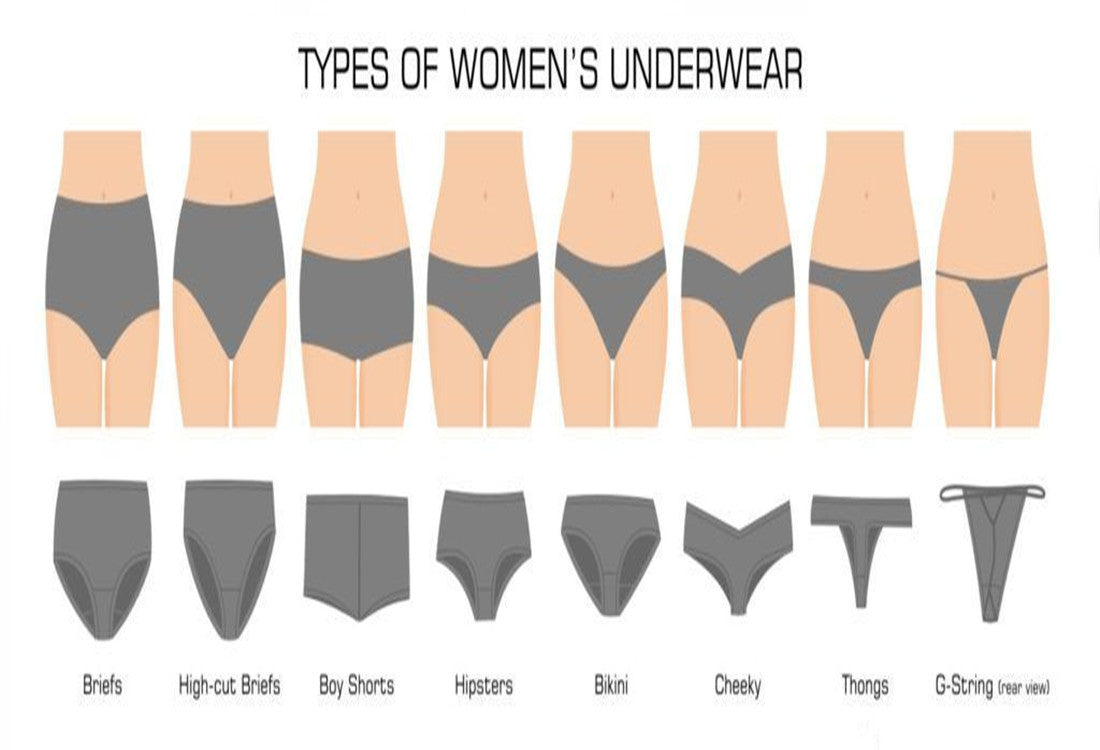Think of your underwear like a safe.
A safe is designed to keep your valuables protected and out of harm’s way. However, if the safe is of poor quality or becomes compromised due to a lack of care, the treasures within can be damaged, making the safe itself completely useless.
The same goes for your underwear. If you wear poor quality underwear or practice bad underwear hygiene, it can wreak havoc on your body. Still, it can be difficult to know if you are doing the right thing—especially when your underwear never seems to get clean in the wash!
Here are a few of our favorite underwear hygiene tips to keep your body and your underwear in good, working order.
- Wear underwear made of natural fibers, like cotton.
As great as those polyester blend thongs are for working out, they should not be worn every day. This is because synthetic fibers are not as breathable as their natural counterparts. Not only can they get sweaty, synthetic fibers can pose unique problems for women, such as throwing off your pH balance or allowing bad bacteria to bloom, which can lead to yeast infections. For this reason, wear underwear made of natural fibers (like cotton!) as much as possible—or at least ensure that the gusset is made from cotton.
The same goes for men. Polyester boxer briefs are comfortable, but due to the lack of breathability, they should only be worn when needed.
- Make sure your underwear fits properly.
Underwear that is too tight can lead to uncomfortable chafing, but it also makes it difficult for your underwear to wick away excess moisture from your skin—you will end up not only uncomfortable, but stinky, too.
However, your underwear should not be too loose, either. Ill-fitting underwear will not cover your sensitive bits as effectively as possible, leaving you in danger of becoming snagged on an errant zipper. Don’t risk it!
- Take special care when washing underwear.
If you have ever felt like your undergarments did not get 100% clean in the wash, you are probably right. In fact, a study from Applied and Environmental Microbiology found that many types of bacteria can actually survive a laundry cycle. Yikes!
Since cooler temperatures of water do not actually do anything to disinfect your underwear, it is important to wash your undergarments in hot water to kill as much bacteria as possible. If you are not able to do this, it is recommended to tumble dry your underwear for at least 30 minutes on low heat to eliminate those dirty bacteria blooms once and for all.
Additionally, you should wash your underwear separately from your other clothes. This prevents underwear bacteria from cross-contaminating your shirts and jeans, but also allows you to wash your underwear in the proper conditions (read: extremely hot water and a warm drying cycle) without worrying about ruining your favorite pair of jeans.
- Don’t go overboard with the laundry detergent, either.
If your undies are not as clean as you would like, it can be tempting to use extra scoops of heavily scented detergents, but this can be damaging for your health, too. Even if you have not experienced skin sensitivity towards fragrance in soap before, it is important to consider that the skin on and around your genitals is very delicate. You wouldn’t spray perfume down there, would you?
Heavily scented laundry soaps can lead to genital irritation, so it is not worth the risk. Instead, use mild soaps and hotter water to kill bacteria without killing your skin.
- Change your underwear every day.
This should be a no-brainer, but always change your underwear (to a clean pair!) every single day. Sitting around in your own stinky, sweaty bodily fluids is not healthy for you and can lessen the longevity of your underwear. If you like, you can even change your underwear multiple times a day, especially after a sweaty workout session! In fact, changing your underwear after working out or getting sweaty is a great practice, because it allows you to remove that stinky bacteria from so close to your skin—bonus points if you shower after working out, too!
- Replace your underwear yearly.
Great news for shopaholics—it is recommended that you should not hold on to underwear for more than a year due to the wash-resistant bacteria we mentioned earlier. After a certain point, there is no chance of saving your underwear, so it’s best to just replace them. If you experience bacterial vaginosis or yeast infections frequently, you may even consider replacing your underwear every six months instead of every year.
- Consider going commando at night.
Some people love sleeping in the nude, while others shudder at the thought. However, sleeping without any underwear is a healthy practice, as it allows your genital region to breathe. In fact, The American College of Obstetricians and Gynecologists found that women who suffer from chronic inflammation or are prone to yeast infections found relief when they went without underwear. This practice is great for men too, though!
If you still are not sure if you want to say goodbye to coverage while you sleep, there is a work around. Instead of being completely bare bottomed, try wearing a pair of loose cotton boxers or flowy pajama pants. This way, your nether region can still breathe, unencumbered by underwear, but you will not have to worry about potential embarrassment should the fire alarm go off…
Underwear hygiene from the underwear professionals.
Caring for your underwear (and your body!) is not always easy, but here at BKage Underwear, we’re here to help.
As the premiere custom underwear manufacturer, we help our customers design undergarments that look great and keep their bodies healthy. Choose from a wide selection of underwear types, fabrics, and designs to create your perfect pair.
Contact us today!




